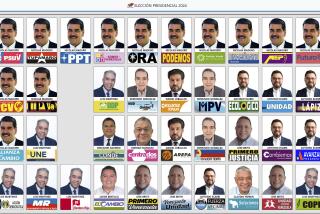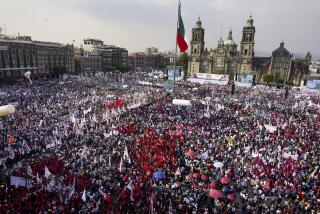Voters May Turn to Old, Familiar Face
- Share via
SANTO DOMINGO, Dominican Republic — At 93, Joaquin Balaguer is legally blind. He’s virtually deaf. He can barely walk. His public appearances are brief and rare.
Yet Balaguer may well be the next president of the Dominican Republic--again.
Opinion polls in advance of Tuesday’s presidential election here show that the authoritarian former leader of this impoverished Caribbean nation could win what would be a record eighth term in office.
“It’s a very perverse example of Caribbean magical realism,” said Bernardo Vega, a Dominican political analyst and former ambassador to the U.S. “It’s the redeemer coming back. The messiah. Except there is no messiah.”
What there is, however, is a complex electoral dynamic facing the republic’s 4.2 million voters next week.
Two other candidates, in fact, have been running ahead of Balaguer in most polls, which all show rancher Hipolito Mejia of the opposition Dominican Revolutionary Party far in front, with nearly twice Balaguer’s support. And most have placed technocrat Danilo Medina from the ruling Dominican Liberation Party in second place by a slim margin.
But Medina’s support appears to be waning amid a lackluster campaign. One poll this week even had Balaguer and his Social Christian Reformist Party in second. And, under a system that requires a Dominican president to get at least 50% of the popular vote or face a second round against his nearest rival 45 days later, all of the polls show front-runner Mejia with less than a majority.
A Balaguer-Medina alliance is considered likely in a June 30 second round that several polls now show would bring “Balaguerismo” back to the presidential palace yet again--if the former leader faces Mejia with the ruling party’s backing.
Much is at stake for the nation and the region.
Economists, diplomats and political analysts here give high marks to outgoing President Leonel Fernandez, a New York-educated 47-year-old who has presided over four years of unprecedented economic growth, privatization and reform that have begun to bring down inflation, unemployment and illiteracy rates. Fernandez is barred from seeking reelection by limits on consecutive terms imposed in the 1990s, but Medina has pledged to continue his programs.
“Whoever wins the election will have to face the fact that the country has matured,” said Paolo Oberti, who heads the U.N. Development Program mission here. “But people in the country still like the authoritarian figure. This is a transition, and it will take time.”
That transition from decades of dictatorship has only just begun. Most of the country’s rapid growth--8.3% last year--and accelerated foreign investment--$1 billion in 1999 alone--have yet to touch the poorest of Dominican poor. The rich have grown richer, while corruption remains endemic and prostitution, drug trafficking and illegal boat journeys to the United States are on the rise.
And it is among the poor that Balaguer’s campaign has had its strongest appeal, sounding a nostalgic note of a bygone era when paternalism and patronage brought at least something to everyone.
The campaign has been surprisingly peaceful, with just one high-profile shooting, in contrast to the 12 dead in campaigning for the May 21 national elections in neighboring Haiti. But Balaguer’s message of security, certainty and government handouts has struck home in the urban slums and feudal countryside. His posters picture him wearing a suit and tie, tipping his black fedora.
One supporter stationed outside the two-story Santo Domingo home that draws throngs of rich and powerful to an unseen Balaguer each day carries a sign declaring, “No one aspires as long as Balaguer respires.” And Balaguer’s main campaign slogan is, “Balaguer returns, for you.”
At one rally this week hosted by Balaguer’s vice presidential running mate, businessman Jacinto Peynaldo, a young woman in the crowd explained why she’s supporting a man three times her age and too weak to attend.
“We don’t need to see him,” she said. “He’s always there. He’s everywhere. He’s like a father to us in a time of need.”
More to Read
Sign up for Essential California
The most important California stories and recommendations in your inbox every morning.
You may occasionally receive promotional content from the Los Angeles Times.













